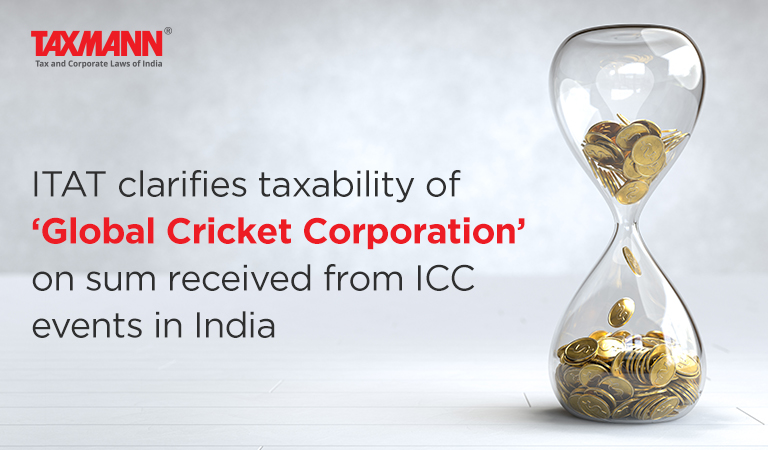ITAT clarifies taxability of ‘Global Cricket Corporation’ on sum received from ICC events in India
- Blog|News|International Tax|
- 2 Min Read
- By Taxmann
- |
- Last Updated on 28 December, 2022

Case Details: ADIT v. Global Cricket Corporation (P.) Ltd. - [2022] 145 taxmann.com 570 (Mumbai-Trib.)
Judiciary and Counsel Details
-
- Om Prakash Kant, Accountant Member & Rahul Chaudhary, Judicial Member
- Girish Dave for the Appellant.
- Percy Pardiwala, Ms Aarti Sathe & Ms Aasavari Kadam for the Respondent.
Facts of the Case
Assessee-Global Cricket Corporation Pte Ltd (GCC) was incorporated as a private company limited by shares in Singapore.
GCC entered into sponsorship agreements with various companies, including LG and Hero Honda, to allow them to advertise on various advertising sites during International Cricket Council (ICC) events. The GCC earned advertising revenues from these agreements. GCC also received payments for broadcasting sporting events. The issue that arose in the instant appeal was the taxability or characterization of the income earned by GCC.
GCC filed return of income declaring nil income claiming the benefit of the DTAA between India and Singapore. GCC claimed that revenue earned by it was business income and not taxable in India in absence of a Permanent Establishment (PE).
During the assessment, the Assessing Officer (AO) held that sum received by GCC for the grant of rights/broadcasting rights was taxable as ‘royalty’. On appeal, the CIT(A) reversed the order of AO. Aggreived-AO filed the instant appeal before the Tribunal.
ITAT Held
The Mumbai Tribunal held that the sponsorship fee received by GCC from Indian advertisers (such as LG/Hero Honda) for advertising at ICC cricket events was for advertising brands/products and not for use of equipment. Thus, the same was not taxable as ‘royalties’ under Art 12 of India-Singapore DTAA.
With regards to the composite license fee received from All India Radio (AIR), Prashar Bharti (PB), Setellite Singapore Pte. Ltd. (SET) that was in respect of live exhibition as well as the non-live exhibition. It was held that the consideration was to be first apportioned between live and non-live exhibition rights and the entire amount in respect of non-live exhibition rights was taxable as “royalties” under Article 12.
The consideration for the live exhibition component was to be further apportioned between the live feed and recorded content in the live feed, In the facts of the case, as the agreement was silent on apportionment, it was held that 25% of the Licensee Fee is a fair estimation of the Licensee Fee attributable to the Non-Live Exhibitions and recorded content in “Live” Feed.
Further, there was no material placed on record by both side to arrive at a more precise or better estimation/apportionment. Accordingly, in view of the above, 25% of the Licensee Fee paid by SET/AIR/Prasar Bharti to GCC as fair estimate of income taxable in India as “royalties” in terms of Article 12(2) read with Article 12(3)(a) of the DTAA.
Disclaimer: The content/information published on the website is only for general information of the user and shall not be construed as legal advice. While the Taxmann has exercised reasonable efforts to ensure the veracity of information/content published, Taxmann shall be under no liability in any manner whatsoever for incorrect information, if any.

Taxmann Publications has a dedicated in-house Research & Editorial Team. This team consists of a team of Chartered Accountants, Company Secretaries, and Lawyers. This team works under the guidance and supervision of editor-in-chief Mr Rakesh Bhargava.
The Research and Editorial Team is responsible for developing reliable and accurate content for the readers. The team follows the six-sigma approach to achieve the benchmark of zero error in its publications and research platforms. The team ensures that the following publication guidelines are thoroughly followed while developing the content:
- The statutory material is obtained only from the authorized and reliable sources
- All the latest developments in the judicial and legislative fields are covered
- Prepare the analytical write-ups on current, controversial, and important issues to help the readers to understand the concept and its implications
- Every content published by Taxmann is complete, accurate and lucid
- All evidence-based statements are supported with proper reference to Section, Circular No., Notification No. or citations
- The golden rules of grammar, style and consistency are thoroughly followed
- Font and size that’s easy to read and remain consistent across all imprint and digital publications are applied



 CA | CS | CMA
CA | CS | CMA
